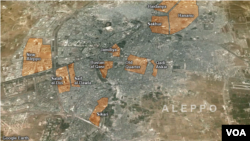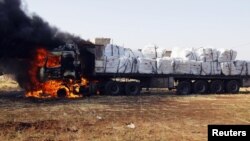Iran's Foreign Minister, Ali Akbar Salehi, says some of the 48 Iranians kidnapped by Syrian rebels are retired members of the Revolutionary Guards and the army and were in Damascus on a religious pilgrimage.
The rebel Free Syrian Army describes those kidnapped Saturday as Revolutionary Guards on a "reconnaissance mission." But Iran's ISNA news agency quoted Salehi Wednesday, as denying that the Iranians have any current military connection.
Salehi's comments were published after he visited Turkey Tuesday to ask for help in securing the hostages' release.
Iranian officials have reached out to both Turkey and Qatar for help in freeing those kidnapped. Both nations support the Syrian opposition, while Iran backs the Syrian government.
'Worst case scenario'
Meanwhile, Jordan's King Abdullah says Syrian President Bashar al-Assad could try to create a stronghold for his minority Alawite sect if he is unable to keep control of the entire country.
In an interview with U.S. broadcaster CBS, the king said such an event would create major problems for the nation's neighbors.
"That would be, I think for us, the worst case scenario because that means then the breakup of greater Syria," said King Abdullah. "And that means that everybody starts land grabbing, which makes no sense to me. If Syria then implodes on itself that would create problems that would take us decades to come back from."
The 17-month uprising against President Assad's rule is driven primarily by Sunni Muslims who make up the majority of Syria's population. Only about 10 percent of Syrians belong to President Assad's Alawite Islamic sect.
King Abdullah said he still thinks there is hope for Syria, but expressed concern about the speed of the international response.
"What I'm worried about, the longer we take to find a political solution, and the more the chaos continues then we may be pushing Syria into the abyss," he said. "My point of view is let’s move as quickly as possible."
Violence continues
The opposition Syrian Observatory for Human Rights reported more clashes Wednesday in Syria's largest city of Aleppo, as well as government shelling in several neighborhoods. It described the clashes in the Aleppo neighborhood of Salaheddin as "the most violent" the neighborhood has seen since rebels took control.
Farther north in Aleppo province, in the town of Tal Rifaat, the Observatory says at least three civilians were killed in an assault by Syrian fighter jets.
Government and opposition claims in Syria are difficult to verify because journalists do not have freedom of movement.
The latest violence comes after Assad vowed Tuesday to purge Syria of what he called "terrorists" and said he would show no leniency.
Rights group Amnesty International released satellite images Tuesday of Aleppo and the surrounding region, showing what it says are signs of increased use of heavy weapons, including near residential areas. The group says the images raise "urgent concerns" about an impending assault on the city.
It warned both rebels and government forces that attacks against civilians will be monitored.
"Amnesty International is sending a clear message to both sides in the fighting: Any attacks against civilians will be clearly documented so that those responsible can be held accountable," Christoph Koettl, emergency response manager for Amnesty International USA, said in the statement.
In all, the Syrian Observatory for Human Rights says more than 20,000 people have been killed across the country since the uprising began in March of last year.
Clinton calls for 'Transition Plan'
U.S. Secretary of State Hillary Clinton says it is time for world powers to begin planning for what will happen after Assad's government falls. She commented during a Tuesday appearance with South Africa's foreign minister in Pretoria.
Clinton said she could not predict when the Assad government would fall, but is confident it will.
"The intensity of the fighting in Aleppo, the defections, really point out how imperative it is that we come together and work toward a good transition plan," she said. "And I would hope that everyone would recognize that the best way to get there quickest is to stop the fighting and begin a political transition to a better future for the Syrian people."
Clinton says she intends to discuss the issue with Turkish officials during her visit to Istanbul on Saturday.
Some information for this report was provided by AP, AFP and Reuters
Photo Gallery: Latest images from Syria
The rebel Free Syrian Army describes those kidnapped Saturday as Revolutionary Guards on a "reconnaissance mission." But Iran's ISNA news agency quoted Salehi Wednesday, as denying that the Iranians have any current military connection.
Salehi's comments were published after he visited Turkey Tuesday to ask for help in securing the hostages' release.
Iranian officials have reached out to both Turkey and Qatar for help in freeing those kidnapped. Both nations support the Syrian opposition, while Iran backs the Syrian government.
'Worst case scenario'
Meanwhile, Jordan's King Abdullah says Syrian President Bashar al-Assad could try to create a stronghold for his minority Alawite sect if he is unable to keep control of the entire country.
In an interview with U.S. broadcaster CBS, the king said such an event would create major problems for the nation's neighbors.
"That would be, I think for us, the worst case scenario because that means then the breakup of greater Syria," said King Abdullah. "And that means that everybody starts land grabbing, which makes no sense to me. If Syria then implodes on itself that would create problems that would take us decades to come back from."
The 17-month uprising against President Assad's rule is driven primarily by Sunni Muslims who make up the majority of Syria's population. Only about 10 percent of Syrians belong to President Assad's Alawite Islamic sect.
King Abdullah said he still thinks there is hope for Syria, but expressed concern about the speed of the international response.
"What I'm worried about, the longer we take to find a political solution, and the more the chaos continues then we may be pushing Syria into the abyss," he said. "My point of view is let’s move as quickly as possible."
Violence continues
The opposition Syrian Observatory for Human Rights reported more clashes Wednesday in Syria's largest city of Aleppo, as well as government shelling in several neighborhoods. It described the clashes in the Aleppo neighborhood of Salaheddin as "the most violent" the neighborhood has seen since rebels took control.
Farther north in Aleppo province, in the town of Tal Rifaat, the Observatory says at least three civilians were killed in an assault by Syrian fighter jets.
Government and opposition claims in Syria are difficult to verify because journalists do not have freedom of movement.
The latest violence comes after Assad vowed Tuesday to purge Syria of what he called "terrorists" and said he would show no leniency.
Rights group Amnesty International released satellite images Tuesday of Aleppo and the surrounding region, showing what it says are signs of increased use of heavy weapons, including near residential areas. The group says the images raise "urgent concerns" about an impending assault on the city.
It warned both rebels and government forces that attacks against civilians will be monitored.
"Amnesty International is sending a clear message to both sides in the fighting: Any attacks against civilians will be clearly documented so that those responsible can be held accountable," Christoph Koettl, emergency response manager for Amnesty International USA, said in the statement.
In all, the Syrian Observatory for Human Rights says more than 20,000 people have been killed across the country since the uprising began in March of last year.
Clinton calls for 'Transition Plan'
U.S. Secretary of State Hillary Clinton says it is time for world powers to begin planning for what will happen after Assad's government falls. She commented during a Tuesday appearance with South Africa's foreign minister in Pretoria.
Clinton said she could not predict when the Assad government would fall, but is confident it will.
"The intensity of the fighting in Aleppo, the defections, really point out how imperative it is that we come together and work toward a good transition plan," she said. "And I would hope that everyone would recognize that the best way to get there quickest is to stop the fighting and begin a political transition to a better future for the Syrian people."
Clinton says she intends to discuss the issue with Turkish officials during her visit to Istanbul on Saturday.
Some information for this report was provided by AP, AFP and Reuters
Photo Gallery: Latest images from Syria
Loading...








